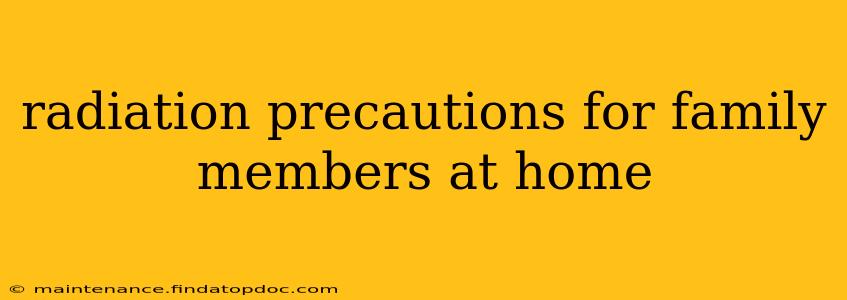Exposure to radiation, whether from medical procedures, environmental sources, or accidents, can be a cause for concern, especially when it involves family members at home. Understanding the potential risks and implementing appropriate precautions is crucial for protecting your loved ones. This guide provides essential information and addresses common questions about radiation safety in the home environment.
What are the common sources of radiation exposure at home?
Radiation exposure at home can stem from several sources, some more prevalent than others. These include:
- Radon: This naturally occurring radioactive gas seeps into homes from the ground. It's a significant source of indoor radiation exposure and is largely undetectable without specialized testing.
- Consumer Products: Some consumer products contain small amounts of radioactive materials. These include certain types of smoke detectors (containing americium-241) and older building materials (containing thorium or radium). The levels of radiation emitted are generally low and pose minimal risk.
- Medical Procedures: Family members who have recently undergone medical procedures involving radiation, such as radiotherapy or nuclear medicine scans, may have residual radioactivity. This is usually temporary and managed by medical professionals.
- Nuclear Accidents or Fallout (unlikely, but important to consider): In extremely rare cases, accidents or fallout could lead to significant radiation exposure. This requires specialized emergency response procedures.
How can I protect my family from radon exposure?
Radon is the most significant radiation risk within a typical home. Here's how you can mitigate it:
- Testing: The first step is radon testing. Kits are readily available online and at hardware stores. Test your home, particularly the basement, to determine radon levels. High levels necessitate mitigation.
- Mitigation: If radon levels are high, mitigation strategies include sealing cracks and crevices in the foundation, installing a radon mitigation system that vents radon gas outside, and improving ventilation.
What precautions should be taken if a family member has undergone a medical procedure involving radiation?
Following a medical procedure involving radiation, it's essential to follow the instructions provided by the medical professionals. General guidelines include:
- Follow Medical Advice: Strictly adhere to any specific instructions regarding isolation, hygiene, or waste disposal given by the healthcare team.
- Hygiene: Encourage good hygiene practices, like regular handwashing.
- Distance: While residual radioactivity is usually minimal and short-lived, maintaining a safe distance, especially for infants and young children, may be advised. Consult your doctor for specific guidance.
- Time Limit: Minimize close contact for a short period as advised by medical professionals. This is usually just a few days or less.
Are there any special precautions needed for pregnant women or young children?
Pregnant women and young children are more vulnerable to the effects of radiation. Therefore, extra precautions should be taken:
- Minimizing Exposure: Keep pregnant women and young children away from sources of radiation as much as possible. This includes limiting exposure to medical imaging where not strictly necessary.
- Radon Mitigation: Ensure radon levels in your home are well below recommended safety levels.
- Medical Advice: Always consult with a healthcare professional before undertaking any medical procedure or if you have concerns about potential radiation exposure.
How can I tell if my family has been exposed to radiation?
Most radiation exposure is undetectable without specialized equipment. However, signs of acute radiation sickness, though rare, include nausea, vomiting, fatigue, and hair loss. If you suspect significant radiation exposure, seek immediate medical attention.
What should I do if I suspect radiation contamination in my home?
If you suspect significant radiation contamination in your home (beyond high radon levels), do not attempt to investigate yourself. Contact your local health authorities or emergency services immediately for guidance and assistance. They have the expertise and equipment to assess the situation safely.
Remember, while radiation exposure is a concern, most sources found in typical homes pose minimal risk. Following basic safety measures, like radon testing and mitigation, and adhering to medical advice following radiation procedures, significantly reduces any potential harm to your family. If you have any specific concerns, consult your doctor or a qualified radiation safety professional.
